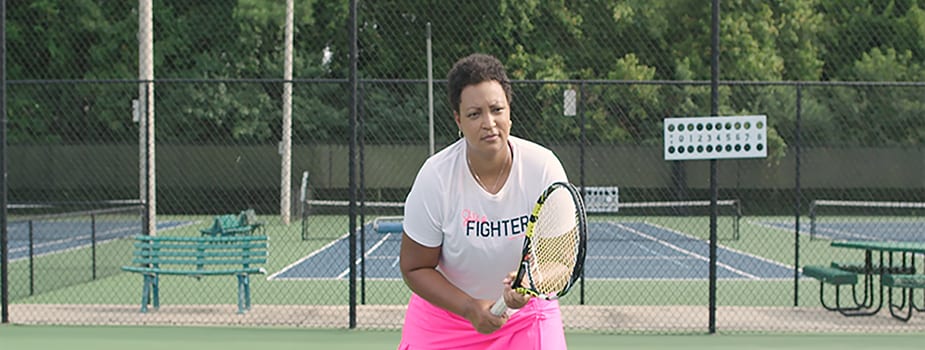
Videos
Cara

Cara, age 30, discusses how her family history of breast cancer and Ashkenazi Jewish heritage inspired her proactive approach to her breast health, allowing her to find her breast cancer early when she was diagnosed at age 25.

Cara’s father encouraged her to get genetic counseling because of her family history of cancer and Ashkenazi Jewish heritage. Cara explains how a genetic counselor helped her understand her personal risk for breast cancer.

When Cara was three years old, her mom passed away from breast cancer at the age of 42. Cara encourages young women with a family history of cancer and Ashkenazi Jewish heritage to learn their risk for breast cancer.
Carletta

Carletta, age 44, talks about how knowing her family history of breast cancer made it easier for her to be proactive about talking to her doctor when she noticed changes in her body. Carletta was diagnosed with breast cancer at age 41, and she finished her first triathlon one year after her first chemotherapy treatment.

Carletta was diagnosed with breast cancer at age 41. Now cancer-free, she is motivated by her ability to do the things that she couldn’t do during treatment. She finished her first triathlon one year after her first round of chemotherapy.

Carletta never met her grandmother, who died from breast cancer at the age of 44. Carletta’s family history inspired her to understand her own risk. She encourages young women with a family history of cancer to learn their risk for breast cancer.
Jackie

Jackie, age 38, has a paternal family history of breast and ovarian cancer and a BRCA gene mutation. She shares how understanding her risk enabled her to take action to reduce her risk for breast and ovarian cancer, and create a roadmap for a bright future for her and her 4-year-old daughter.

Jackie saw many relatives on her father’s side of the family get diagnosed with and die from breast or ovarian cancer. Because of her family history, her doctor recommended she receive genetic counseling. Jackie explains her experience with genetic counseling and testing.

Jackie took steps to learn about her risk for breast and ovarian cancer because of her family history.
Lisa

Lisa talks about how she realized that having family members with pre-menopausal breast and ovarian cancer meant that she has a higher risk of getting cancer before she turned 45. She talks about how this affected her as a young mother and why she takes steps to manage her risk. Lisa provides a tip for talking with family members about their history of cancer.

Lisa’s family history of breast and ovarian cancer puts her at higher risk for getting cancer in the future. Watch this video to learn how she’s used this information to empower herself.

Lisa, age 41, talks about how her family history led her to get genetic counseling and testing for BRCA gene mutations. She describes the genetic testing experience, and how it helped her understand her family history and manage her risk for breast cancer.

Lisa, age 41, talks about her decision to get genetic counseling and testing to find out if she had a BRCA gene mutation, and how the experience empowered her to understand her options and be her own best health advocate.
Marleah

When Marleah was 8 years old, she watched her mother, then 38, go through treatment for breast cancer. Her mother’s experience inspired her to understand and her own risk, and she learned that she has a BRCA2 gene mutation like her mom and aunt. To manage her risk, Marleah currently undergoes surveillance.

Marleah’s family history of breast cancer was her motivation for pursuing a career where she can be an advocate for herself and others at high risk. At 27, Marleah explains that understanding her risk has been an emotional journey, but also a good journey.

Marleah took steps to understand her risk for breast cancer because of her family history. She encourages young women with a family history of cancer to learn their personal risk.
From a Genetic Counselor

Genetic counselor Joyce Turner, MSC, CGC, explains how family history of breast cancer may indicate inherited changes in genes that increase your personal risk for breast cancer. She offers action steps you can take if you have concerns about your personal risk of breast cancer.

Genetic counselor Joyce Turner, MSC, CGC, explains that if you have a family history of breast cancer, it is important to speak with a genetic counselor or a health professional who can talk to you about your personal risk of developing breast cancer.

Genetic counselor Joyce Turner, MSC, CGC, provides an overview of BRCA genes and their relationship to breast and ovarian cancer. She explains how each of us inherits BRCA genes from our parents, the role of those genes and what happens if we inherit a gene mutation. She also talks about how genetic counseling and testing can give a woman information she can use to make decisions about her health.

In this video, genetic counselor Joyce Turner, MSC, CGC, explains what the BRCA1 and BRCA2 genes are and how a mutation in either gene can lead to cancer. She also discusses how genetic counseling and testing can help women make informed decisions about their health.





















.png)












No hay comentarios:
Publicar un comentario